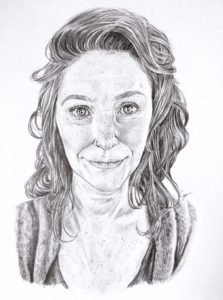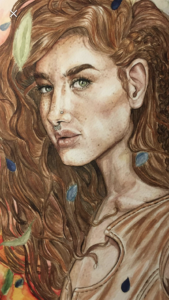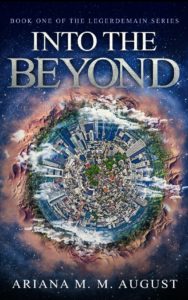Tellest: Hi there, and welcome to the interview. I wanted to thank you for taking time out of your busy writing schedule to talk to us. I’m going to start you off with a common question: What got you started writing?
Ariana August: I love this question! My first memory of writing is age 7, when with my mother at one of her college classes. To keep me busy, she gave me a list of four words and told me to write a story using them. I still remember the burst of excitement I felt inside my chest — I could create whatever I wanted! I could make a story! It ended up being about a blue cup with a chip in it, and a picnic under a tree. And I’ve always loved to read, which I think is important to developing as a writer. My tastes have changed over the years, but I’m grateful for every book I’ve read. They’re all part of my journey.
T: Do you remember the four words?
AA: I remember two of the items: the blue cup with a chip in it, and the picnic basket. I’ve been practicing lucid dreaming, in hopes that one day I can ask my deep subconscious what the other two items were!
T: Lucid dreaming is one of those things where if you master it, you can create stories for yourself in a time of respite. Is that another reason you’re practicing?
AA: Oh for sure. Anything I can do to nurture the more magical side of life is something I’m interested in. I’m generally pretty good at being a grown-up, but honestly if I could just pay someone to take care of the ‘adulting’ tasks for me so I could write and daydream and go for walks and hang out by the ocean all day, I’d be SO happy!
T: You also do a fair share of editing as well. Which do you prefer to do more, and why?
AA: It depends! As I’ve grown into publishing my own novels, I haven’t been taking very many editing clients. These days, I spend a lot of time editing my own novels. Writing a story, getting to know the characters, and building their world is such a thrill!
T: There’s a joke that we’re blind to our own faults but we’re more careful with other people’s work. Do you find yourself missing things during the editing process that you wouldn’t expect?
AA: Yes, all the time. It’s so funny and a little embarrassing! I also think auto-correct is both terrible and wonderful. It catches some things I might miss as I’m writing because I type at such a high speed, but it also tends to correct things such as ‘its’ to ‘it’s’ which drives me nuts during the first round of edits!
T: Can you tell us anything about what inspired your characters?
AA: Sure! The characters from the Legerdemain series came to me via dream sequences I had, over the course of a couple of nights. Two of those dreams are in the first book of the Legerdemain series, Into The Beyond. I’d be so curious to know if any of my readers can guess which scenes are based on those dreams! Esme, the MC of the Legerdemain series, was the first character I saw in my dreams. She carries a deep inner power, a sense of adventure, and curiosity about the world around her that I’m honored to be able to bring to the page. I’ve also had other novels that have been inspired by exploring my past lives with the help of guided meditation. A ‘meeting of the muse’ you might say!
T: In Into the Beyond, the pseudo-utopia you’ve created ends up feeling more like a prison than anything else. Do you think the concept of life in a domed city like Legerdemain is inherently doomed to fail?
AA: Utopias are such an interesting concept, aren’t they? How can you create a society that must live in seclusion without it almost certainly becoming unhealthy? The reasons for doomed utopias are many. We know that having power in a society literally changes people’s brains so that they’re less empathetic. Those who rise to power often come to feel like they deserve to be in charge because there is something ‘special’ about them – and so they bend or break the people beneath them to their will. In Legerdemain, you can see this most obviously in the character of one of the main antagonists, Aditi. She wants so badly to believe that her life wasn’t destroyed by the restrictive rules she is surrounded by, so she goes to great lengths to prove to everyone around her how happy she is and how perfect everything in Legerdemain has become because of her and the Council. Of course, it becomes clear very quickly just how damaged and broken-hearted Aditi actually is.
T: You mentioned that your story and your characters were derived from dreams and meditation, but how much of the real world do you see in your books as well?
AA: Hmm, good question. I’m not creating an entirely new language for my novels. Beyond that, I think the worlds that my characters inhabit are fairly unique, and my readers seem to agree! However, my real-life interests in equality, self-expression, and other topics usually find their way into my novels. I have a favorite quote by Toni Morrison that says, “All good art is political! There is none that isn’t.” I think that’s very true – when you’re reading about another society and the characters in that novel are experiencing injustice, it can open your eyes to similar abuses that are happening within your own community.
T: How do you think your characters would react to our world?
AA: Wow, I really love your questions!
-
Esme would be horrified that women are being forced to wed against their will and she’d probably be an attorney for underserved communities or helping fund start-ups for women in low-income areas.
-
Akuna wouldn’t be surprised by our current political situation *at all* and she’d end up being a supreme court justice, or a civil rights leader.
-
Theia would initially act like she didn’t care about the problems facing our world, but then she’d come up with some awesome social media plan to get people motivated to save our wildlands.
-
Massimo would leave his Mommy’s mansion and go to a third-world country with a nice beach, grow a garden, eschew money in favor of a barter system, and on the rare occasion when he eats out, tip the locals *really* well.
-
Asa would pick up a sword (his pen) and fight some of the bad dudes by becoming a journalist at a high-integrity publication such as The New Yorker.
-
Silas would kinda make efforts to help his friends but would end up pouting in a corner playing video games because no one was paying attention to him, and
-
Zach would probably disappear to Bali and become a spiritual tattoo artist!
T: The story has some pretty hefty ethical questions that it poses. What made you decide to tackle these ideas?
AA: Several things, really. I grew up in a pretty conservative environment, similar to Legerdemain in many ways – although unlike Esme, none of my boyfriend’s parents ever watched me make out with their son so that they could judge how compatible we might be (thank goodness)! Like Esme, I didn’t even realize until I was of age that there were other options besides falling in love with a man, getting married and having babies. Our culture these days reflects so many more lifestyles than that, and I’m glad of that. It’s becoming more accepted and safe to be who you are, and I think that’s awesome.
The characters in my book are diverse – straight, gay, in-between; different colors and different beliefs. In Esme’s ideal world, all that matters is what’s in your heart. Then there’s the dynamic of the Snatchers, which I won’t get into too much here because spoilers! But writing the Snatchers was a big challenge – especially the ones who turn out to not be all bad, in the end. Humans are diverse, complicated beings, and many of the decisions we make are based on our upbringing. So I took my knowledge the psychology of human flaws, plopped my characters into a Mad Max/Wild West sort of world, and wrote a book series about it!
T: In a lot of ways, you’re challenging yourself to write about many things in “grey” terms. It comes across as very introspective, which I’m sure a lot of readers will appreciate. Was it hard to visualize things from a few different perspectives?
AA: Well, I’ll tell you a secret. One time, years ago, a woman I knew told me that no one knew what to make of me because I could see a particular situation that our community was dealing with from everyone’s perspective. I think that’s a valuable skill. But it also made me question whether I was being totally honest about my own opinions and feelings. Since then, I’ve also come to realize that it’s not only good, but often morally necessary, to take a stand for what you truly believe in. A lot of what Esme, the main character of The Legerdemain Series deals with, are those same moral gray areas: Should she and her friends try to stop the Snatchers from kidnapping their unwilling brides, or respect the fact that the Snatchers understand life differently, and leave them alone? And what about the mating rituals of Legerdemain? Are those right, wrong, or somewhere in-between? Since Into The Beyond is the first book of this series, none of those questions get resolved quite yet – but the characters sure have a lot of adventures while exploring the possible answers!
T: Do you feel like people who like the more popular teen fiction, like Hunger Games, Maze Runner and Divergent, will enjoy your books? What would you tell them to drive them to your stories?
AA: Yes, I think they’d love the Legerdemain series! Esme is technically an adult, but the books are full of adventure that anyone of any age can appreciate. There’s an overarching plot to figure out who the bad guys really are and efforts to stop them – but it’s also much more than that. There’s the internal conflict that Esme has about leaving Legerdemain, for example – will she follow her best friend into the unknown Desertlands, or remain safe (but totally stifled) inside the safety of the dome? Who will she be once she emerges from the mental and physical confines of her formative years? What does she even want from life? I think these questions are ones we all ask ourselves at times – which is why everyone who reads Into The Beyond can relate to Esme, regardless of their gender or age. The other series I am releasing this year, The Unbroken Trilogy, is new adult literary fantasy – lots of vivid descriptions of setting, and deeper dives into the main character’s inner world as well as her spiritual and moral imperatives.
T: As a follow-up to that previous question, the Legerdemain series brings a version of romance and intimacy (or lack thereof) front and center. What can you tell us about how you developed that and where you want it to go?
AA: To be honest, it developed as I wrote it! That’s how nearly all my stories come to me: I have an idea, or a dream of what I know I’ll write next, and I just jump in and begin writing. The characters tell me their story, and I record it as I’m shown it. Emse has changed her mind a few times about what she wants, and it’s no wonder: until she makes the fateful decision that starts her down the heroine’s path, she’s never let herself consider any other option than being wed to whomever the Council decided to choose for her. So what does Esme really want? A ‘twin-flame’ connection? Someone who will understand and support her when she places herself in danger to try to save her friends? Does she even *like* being pursued, or because of the forced ritualistic courting traditions in Legerdemain, does she find it unpalatable? Perhaps she’d like to be the one doing the choosing, if and when she feels the time is right! No spoilers, but I will say: the romance is there, it’s been really fun to write, and if you like reading about kissing, there’s a bit of that in this book for you.
T: You have another series on the horizon as well, too, right? Any light details you can tell us about that one?
AA: Yes, The Unbroken Trilogy, and I’m so excited about it! Here’s a little teaser: imagine a world where men can only be of three castes: slaves, prostitutes, and breeders. Now imagine they don’t like that at all, and they fight back. Picture a female MC who is Queen of this world, and who believes absolutely that keeping men suppressed is the only way to keep her world safe. The first book in that series, called The Unbroken, will be available sometime later this Spring.
T: Almost sounds like a gender-swapped Handmaid’s Tale!
AA: Ha! Well, I do love that novel, as well as the television series that is based on it. However, the world where The Unbroken takes place, called Eltrea, is a bit different. It is similar to Ancient Greece in dress, climate, and technology (or lack thereof). Eltrea does have one, rather notable difference from Greece — their female Seers (and Sha’le, the main character who is about to become Queen), can leave their bodies and enter into the Spirit Realm. This ability to literally see and understand the motives of others has always protected Eltrea, but that all changes right before Sha’le takes her throne. If I had to describe the Eltrea Series, I’d say it’s a cross between a gender-swapped Handmaid’s Tale mixed with some similarities to N. K. Jemisin’s Dreamblood Series. And then there’s the rather generous peek into the intimate aspects of the relationships between Sha’le and her three Unbroken!
T: How much of your books do you have planned out? Another way to ask that, I guess, is are you a “pantser” or a “plotter”?
AA: In almost every way, a pantser. Although, I always reach a certain point in the writing process where I think to myself: “hmm, now which character was the one whose parents were born before XYZ happened?” And then I make a timeline, or a rough draft of what I think might happen in the next few chapters. I also keep track (as I go) of important details such as how old each character is, and when they know information that’s important to the plot (so I don’t get ahead of myself!). In the past, I would try to plot everything out and I was just so unhappy —I’d be trying to figure out how to make a particular chapter work within the outline I’d created, when meanwhile, my characters wanted to skip ahead to the adventure I’d saved for chapter twenty!
Thanks so much for having me, this has been great fun! And if any of you reading this interview have questions for me, I’d love to chat. Find me on Twitter and Insta—@arianammaugust or www.arianammaugust.com
I want to thank Miss August for setting aside a tremendous amount of her time to tell her story. This was a fun dive into what makes her and her worlds tick. Into the Beyond is out now, so head over to Amazon to pick it up!
Michael DeAngelo
Latest posts by Michael DeAngelo (see all)
- Fantasy Promo – Quinine - July 25, 2024
- Sigil Art – Grim’s Hold - July 24, 2024
- Fantasy Promo – Light the Shadows (Under Elfhame’s Stars) - July 24, 2024


